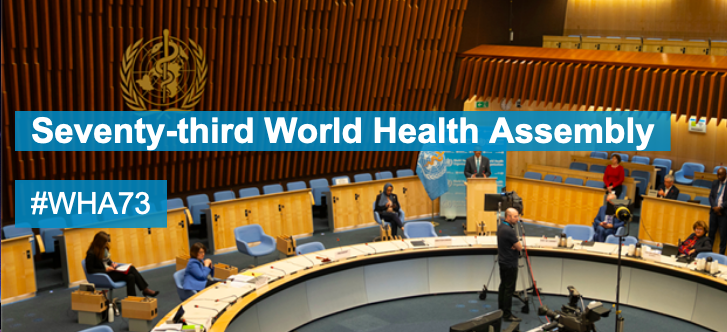Alliance members stress need for an FCGH at World Health Assembly
FCGH Alliance members were present at the 73rd World Health Assembly 18-19 May 2020. Alliance for Health Promotion and International Alliance of Patients’ Organizations stressed the need for accountability and collaboration in response to the COVID-19 pandemic. Such a response could be achieved through an FCGH.
Statement of Alliance for Health Promotion to the 73rd WHA
Even with the present global priority on responding to COVID-19, it is not too soon to consider how to strengthen global governance to prevent future health crises. As WHO and the international community begin to look towards the future, we encourage the Director-General and member states to place a Framework Convention on Global Health (FCGH) as a new, core feature of that governance.
The FCGH would be a global treaty with the mission of accountability to right to health, aimed at national and domestic health equity. In its detailed framework on the right to health and the mechanisms it offers, it would empower health ministries and governments to advance the right to health, and populations to claim it. The right to health is necessary to achieve global health security. Countries and the world will not be protected against public health threats such as novel and emerging infections if any part of the population, however poor and marginalized, is neglected, just as no country is safe unless all countries are safe.
The FCGH would advance health equity, accountability, and participation meaning, for instance, pandemic planning and responses that encompass the needs of all populations. The treaty would resource the right to health, with a domestic and global health financing framework for funding robust, responsive public health systems, including laboratories, surveillance, and other centerpieces of health security. And the FCGH would encompass all sectors and actors, nationally and globally. This would, for example, address such risks to the right to health and health security as animal markets, and ensure that intellectual property rights never impede access to affordable vaccines and therapies.
We urge WHO and member states, when attention turns to recovering better, to include the FCGH as an integral part of the global health architecture.
Statement of International Alliance of Patients’ Organizations to the 73rd WHA
IAPO is representing one of the most vulnerable groups in our society. Our patient members in many WHO Member States are now seeking protection behind national shielding programmes due to their underlying chronic conditions and immunocompromised status
IAPO was appalled to see how lockdowns without plans and lack of patient engagement resulted in great lapses of patient safety, breaches of human rights (police action) and loss of trust in health systems. Patient safety and health professional safety was compromised by lack of healthcare availability, access, acceptance and quality. We are urging all WHO Member States to adopt a human rights-based approach to their public health measures.
IAPO suppports EB146.R10 Agenda item 15.2 8 February 2020 Strengthening preparedness for health emergencies: implementation of the International Health Regulations (2005). A new Framework Convention for Global Health is now needed to ensure an equitable and collaborative global response to pandemics like COVID-19 in future. We urge Member States to improve global collaboration through expert-patient engagement, shared lessons, shared equipment and supplies, and shared diagnostics, therapies, and vaccines.
While WHO guidance documents are vital, a wealth of real-world lessons and patient-perspectives are now emerging. These can strengthen humane and science-based approaches to lockdowns and reopening of economies, while addressing domestic violence and protecting marginalized populations. We urge all UN agencies involved with SDG 2030 to work with WHO, Member States, patient organizations, non State Actors, academics, and journalists to develop and continuously update the comprehensive open access online platforms, benefiting from wide input and sharing and accessing expert patient, academic and other research and insights on emerging lessons on health and policy responses to COVID-19.
Thank you for your attention.

